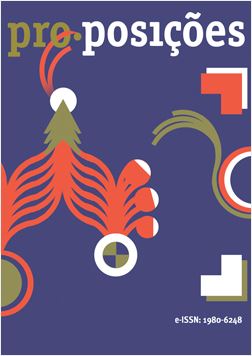Abstract
The objective of this study was to design and evaluate the effectiveness of a theoretical/self-reflective intervention to streng then teachers' learning strategies in a double perspective: as a student and as a teacher. The sample was composed of three high school teachers. Data were collected using four qualitative instruments. The results showed that the intervention had positive effects. As students, teachers began to reflect more on their own learning and the strategies they use to learn. As teachers, they felt more capable and motivated to teach learning strategies to their students. It is hoped that this intervention can be reapplied in a higher number of teachers so that more students can learn strategically.
References
Andrzejewski, C.E., Davis, H.A., Bruening, P.S., & Poirier, R.R. (2016). Can a self-regulated strategy intervention close the achievement gap? Exploring a classroom-based intervention in 9 th grade earth science. Learning and individual differences, 49, 85-99.
Ávila, L.T.G., Pranke, A., & Frison, L.M.B. (2018). O uso de estratégias autorregulatórias para aprender e para ensinar: formação de professores. Perspectiva, 36(4), 1265-1280.
Bardin, L. (2004). Análise de Conteúdo (3.ed). Portugal: Edições 70.
Bembenutty, H. (2015). Self-regulated learning and development in teacher preparation training. Springer Briefs in Education, 9-28.
Boruchovitch, E. (2009). Protocolo de ativação da metacognição e da autorreflexão sobre a aprendizagem do futuro professor. Manuscrito não publicado. Universidade Estadual de Campinas.
Boruchovitch, E. (2010). Entrevista semiestruturada com base no roteiro de entrevista para avaliação do impacto de uma intervenção na aprendizagem e na vida dos participantes
Boruchovitch, E., & Ganda, D.R. (2013). Fostering self-regulated skills in an educational psychology course for Brazilian preservice teachers. Journal of cognitive education and psychology, 12(2), 157-177.
Boruchovitch, E., & Machado, A.C.T.A. (2017). A autorregulação da aprendizagem na formação inicial e continuada de professores: como intervir para desenvolver? In: S.A.J. Polydoro. Promoção da autorregulação da aprendizagem: contribuições da teoria social cognitiva (pp 90-104). Porto Alegre: Letra 1.
Cleary, T. J., & Platten, P. (2013). Examining the correspondence between self-regulated learning and academic achievement: A case study analysis [special issue]. Educational Research International
Dembo, M. H. (2001). Learning to teach is not enough: Future teachers also need to learn to learn. Teacher Education Quarterly, 28(4), 23-35.
Dembo, M.H., & Seli, H. (2008). Motivation and learning strategies for college success New York: Routledge.
Finsterwald, M., Wagner, P., Schober, B., Lüftenegger, M., & Spiel, C. (2013). Fostering lifelong learning – evaluation of a teacher education program for professional teachers. Teacher and teacher education, 29, 144-155.
Frison, L.M.B. (2017). Formação de professores: uma proposta de intervenção ancorada na autorregulação da aprendizagem. In: S.A.J. Polydoro. Promoção da autorregulação da aprendizagem: contribuições da teoria social cognitiva (pp. 163-176). Porto Alegre: Letra 1.
Ganda, D. R., & Boruchovitch, E. (2019). Intervenção em autorregulação da aprendizagem com alunos do Ensino Superior: análise da produção científica. Estudos interdisciplinares em Psicologia, 10(3), 3-25.
Ganda, D.R., & Boruchovitch, E. (2018). Promoting self-regulated learning of brasilian preservice student teachers: results of an intervention program. Frontiers in Education, 3(5), 1-12.
Góes, N.M. (2020). As variáveis relacionadas à aprendizagem de alunos e professores do ensino médio e o desenvolvimento de um programa de intervenção em estratégias de aprendizagem. Tese de Doutorado. Universidade Estadual de Campinas, São Paulo, Brasil.
Klug, J., Schultes, M.T., & Spiel, C. (2018). Assessment at school – Teachers’ diary-supported implementation of a training program. Teaching and teacher education, 76, 298-308.
Kramarski, B., & Kohen, Z. (2016). Promoting preservice teachers’ dual self-regulation roles as learners and as teachers: effects of generic vs. specific prompts. Metacognition and learning, 12, 157-191.
Lau, K.L. (2013). Chinese language teachers’ perception and implementation of self-regulated learning-based instruction. Teaching and teacher education, 31, 56-66.
Machado, A.C.T.A., & Boruchovitch, E. (2018). A autorregulação da aprendizagem: formação de docentes e discentes no contexto educacional. Revista de Educação PUC-Campinas, 23(3), 337-348.
Marini, J.A.S., & Boruchovitch, E. (2014). Autorregulação da aprendizagem em estudantes de Pedagogia. Paidéia, 24(59), 323-330.
McCombs, B.L. (2017). Historical review of learning strategies research: strategies for the whole learner – A tribute to Claire Ellen Weinstein and early researchers of this topic. Frontiers in Education, 2(6), 1-21.
Rosa, C.T.W., & Rosa, A.B. (2016). Ensino de Física por estratégias metacognitivas: análise da prática docente. Revista electónica de investigación em educación em ciencias, 11(1), 1-7.
Santos, O.J.X., & Boruchovitch, E. (2011). Estratégias de aprendizagem e aprender a aprender: concepções e conhecimento de professores. Psicologia: Ciência e Profissão, 31(2), 284-295.
Staley, R., & Dubois, N. F. (1996). A self-regulated learning approach to teaching educational psychology Paper presented at the Meeting of the American Educational Research Association, New York, NY.
Veiga Simão, A. M. (2004). O conhecimento estratégico e a auto-regulação da aprendizagem: implicações em contexto escolar. In A. Lopes da Silva, A. M. Duarte, I. Sá, & A. M. Veiga Simão (Orgs.). Aprendizagem auto-regulada pelo estudante: perspectivas psicológicas e educacionais (pp.77-94). Porto: Porto Editora.
Vosniadou, S., Lawson, M.J., Wyra, M., Deur, P.V., Jeffries, D., & Darmawan, I.G.N. (2020). Pre-service teachers’ beliefs about learning and teaching and about the self-regulation of learning: a conceptual change perspective. International Journal of Educational Research, 99, 1-17.
Wang, Y., & Sperling, R.A. (2020). Characteristics of effective self-regulated learning interventions in mathematics classrooms: A systematic review. Frontiers in Education, 5(58), 1-17.
Weinstein, C. H., & Acee, T. W. (2018). Study and learning strategies. In R. F. Flippo & T. W. Bean (Eds.), Handbook of college reading and study strategy research (pp.227-240). New York: Routledge.
Weinstein, C.E., & Mayer, R.E. (1985). The teaching of learning strategies. In M. Wittrock. (Org.), Handbook of research on teaching (pp.315-327). New York: Macmillan.
Xu, H., & Ko, P.Y. (2019). Enhancing teachers’ knowledge of how to promote self-regulated learning in primary school students: A case study in Hong Kong. Teaching and Teacher education, 80, 106-114.
Zimmerman, B. J. (2002). Becoming a self-regulated learner: an overview. Theory into practice, 41(2), 64-70.
Zimmerman, B.J. (2013). From cognitive modeling to self-regulation: a social cognitive career path. Educational Psychologist, 48(3), 135-147.

This work is licensed under a Creative Commons Attribution 4.0 International License.
Copyright (c) 2022 Pro-Posições


